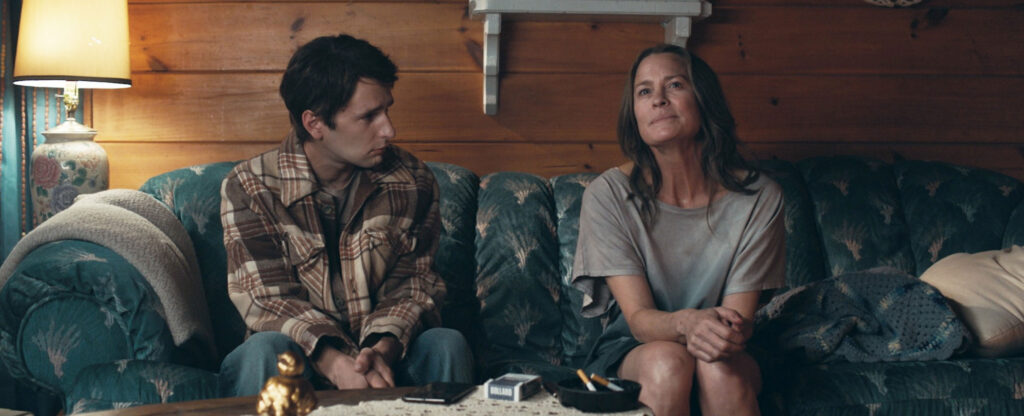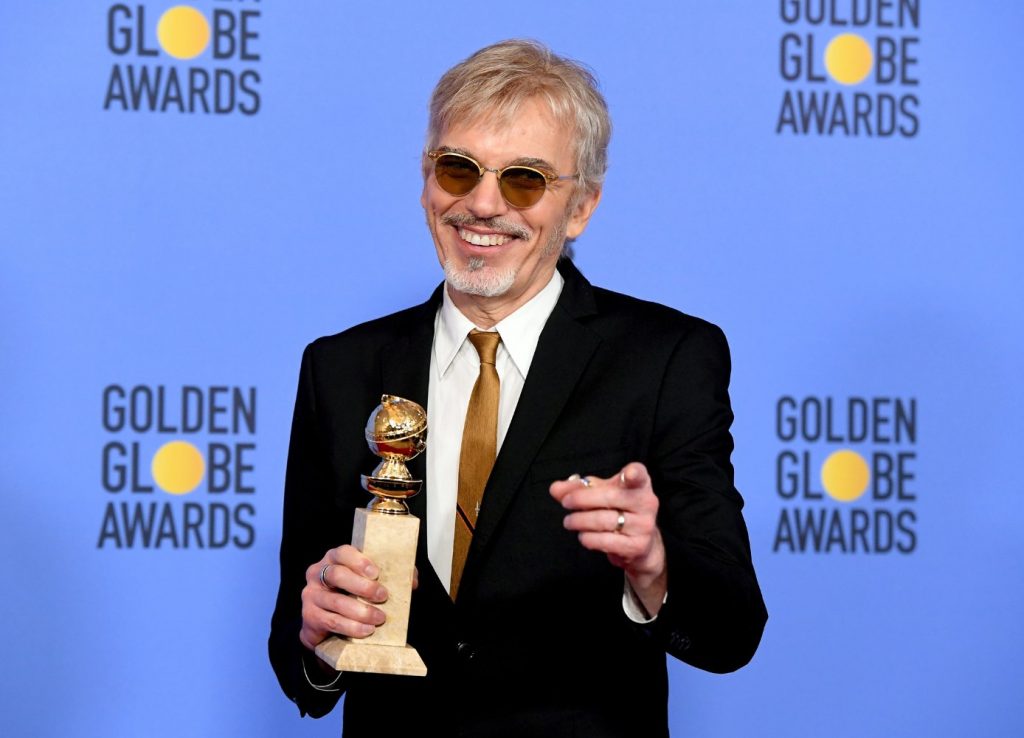April 15, 2023
by Carla Hay

Directed by Ben Young
Culture Representation: Taking place in Jackson County, North Carolina, the dramatic film “Devil’s Peak” features an all-white cast of characters representing the working-class, middle-class and criminal underground.
Culture Clash: A young man tries to start a life apart from his drug-dealing father, who expects him to take over this family’s criminal business, while the father of the young man’s girlfriend is the district attorney who has been targeting the drug-dealing father in a sting operation.
Culture Audience: “Devil’s Peak” will appeal primarily to people who are interested in watching convoluted and fake-looking crime dramas.

The novelty of real-life mother-and-son duo Robin Wright and Hopper Penn portraying a mother and a son in “Devil’s Peak” is not enough reason to watch this dreadful crime drama with a putrid plot and subpar acting. Almost nothing in this flop is believable. It’s the type of dreck that is overstuffed with bad dialogue and ridiculous plot twists that add up to a complete waste of time.
Directed by Ben Young, “Devil’s Peak” is based on David Joy’s 2015 novel “Where All Light Tends to Go.” Robert Knott wrote the low-quality adapted screenplay for “Devil’s Peak.” Just when you think the movie can’t get any worse, the last 15 minutes are such a pile-on of utter stupidity, it will have viewers rolling their eyes more than the tweaking meth addicts who are the customers of the drug-dealing family at the center of the story.
“Devil’s Peak” opens with a scene of a terrified-looking guy in his late teens named Jacob McNeely (played by Penn), who is half-crouched behind his truck that’s parked on an deserted road. He’s pointing his rifle at an approaching car and has the stance of someone who’s expecting a shootout. The movie circles back to this scene in the last third of the film to reveal who’s in this showdown with Jacob.
Viewers will know from the beginning of “Devil’s Peak” to brace for some bad dialogue when Jacob is heard saying in this voiceover narration: “In Jackson County, North Carolina, my family name meant something. Our family was a matter of blood, just like hair color and height. By the time I was 9 or 10, Daddy had me breaking down big bags of crystal meth.”
Jacob continues, “He got them from the Mexicans through his biker buddy Ed McGraw. The auto shop was a front, where I worked with Gerald Cabe and his skinny-ass brother Jeremy Cabe. They were the ones who did Daddy’s dirty work. And everyone in these parts knew he was not the kind of man you want to cross.”
If you can get past the ridiculousness that a guy who’s being groomed by his father to be a menacing drug dealer is still calling his father “Daddy,” there’s still more phony garbage to come in “Devil’s Peak.” It doesn’t help that many of the cast members either over-act or their acting is too stiff. Try not to laugh at the cringeworthy utterings of Jacob as he continues to tell his story in voiceover narration.
“Even though they were mean as hell,” Jacob says, “the Cabe brothers were the closest thing I had to kin. Methamphetamine was a living, breathing body in Jackson County. Daddy was the heart-pumping blood in every vein in the region.”
Jacob continues, “I got a cut from the sales, like most kids got allowance. But Daddy held on to my money. Maybe it’s a life I could’ve accepted, like generations of McNeelys had done before me. But Maggie Jennings, she made it so I couldn’t.”
Viewers soon find out that Maggie (played by Katelyn Nacon) is Jacob’s 18-year-old girlfriend, who lives with her mother and stepfather in an upper-middle-class part of Jackson Country. Maggie is a “good girl” who plans to go to the University of North Carolina Wilmington. Maggie wants Jacob to go to the same university with her at the same time.
But Jacob’s ruthless father Charlie McNeely (played by Billy Bob Thornton) has other plans for Jacob: He expects Jacob to stay in the family’s meth distribution business. Charlie says to Jacob at one point in the movie: “We did not choose this way of life. It chose us. It’ll be that way until we ain’t breathing.”
And to make matters more complicated, Maggie’s stepfather is district attorney Bob Jones (played by Brian d’Arcy James), who is up for re-election and has been targeting Charlie and his gang for a major drug bust. Bob has secrets that are eventually revealed in the movie. The secrets should come as no surprise to viewers who’ve seen enough of these types of films where politicians can be just as corrupt as the criminals.
As a money-laundering cover for his drug dealing, Charlie owns and operates a mechanic shop called McNeely’s Automotive. All of the men who work at the shop, including Jacob, are really part of the McNeely drug gang. The aforementioned brothers Jeremy Cabe (played by Jared Bankens) and Gerald Cabe (played by David Kallaway) are stereotypical sleazeballs. (The story in “Devil’s Peak” takes place in North Carolina, but the movie was actually filmed in Georgia.)
One of the worst and most unbelievable things about “Devil’s Peak” is that the McNeelys are supposedly the most powerful drug-dealing family in Jackson County for generations, with the current district attorney intent on busting them. But only two cops are part of this story: Sheriff Rogers (played by Jackie Earle Haley) has been in law enforcement in Jackson County for years and knows all about the McNeely family. A junior officer named C. Bullock, also known as Bull (played by Harrison Gilbertson), is a hothead bully who likes to pick on Jacob.
Sheriff Rogers has a soft spot for Jacob’s mother Virgie (played by Wright), a forlorn meth addict who has been trying unsuccessfully for years to conquer her addiction and clean up her act. Virgie and Charlie have been divorced since Jacob was a child. Charlie is still bitter because Virgie cheated on him when they were married, but viewers will get the impression that hypocrite Charlie isn’t exactly the “faithful spouse” type either.
Virgie is currently down on her luck, unemployed, and living in near-poverty. She doesn’t have a car, but sympathetic Sheriff Rogers sometimes gives her car rides and looks out for Virgie as much as he can. The movie shows hints that Sheriff Rogers probably has romantic feelings for Virgie. Because of her drug addiction, Virgie has been in and out of Jacob’s life. Charlie has been the parent who has primarily raised Jacob. And Charlie doesn’t let Jacob forget it.
As the emotionally broken Virgie, Wright gives perhaps the closest thing to an authentic-looking performance in “Devil’s Peak.” Unfortunately, she’s not in the movie for very long (her screen time is less than 20 minutes), and her scenes consists mostly of Virgie apologetically trying to reconnect with Jacob, or Virgie defensively trying to convince suspicious Charlie that she’s not a confidential informant for the police. Virgie is openly driving around with Sheriff Rogers in his squad car, so it’s no wonder that Charlie thinks that desperate drug addict Virgie might be getting paid to set up Charlie to get arrested.
Charlie has a girlfriend who’s young enough to be his daughter. Her name is Josephine, nicknamed Josie (played by Emma Booth), and she goes along with whatever Charlie wants. Josephine shows a little bit of sassiness and occasionally talks back to Charlie, but he’s really the one in control of the relationship. “Devil’s Peak” is ultimately a male-dominated movie where the few female characters in the film just react to whatever the men are doing.
The rest of “Devil’s Peak” involves murders, a kidnapping, chase scenes and a race against time for people who want possession of Charlie’s hidden stash of cash. Thornton’s portrayal of Charlie is a caricature of a villain, with every action utterly predictable and soulless. Penn, who pouts his way through his performance, lacks charisma in his role as protagonist Jacob. And that’s a problem when viewers are supposed to be rooting for the protagonist.
“Devil’s Peak” tries to cram in too many “surprises” in the last 15 minutes of the film. It all looks so fake, because the movie makes it look like there are only two cops in Jackson County who are dealing with the huge mess that Charlie causes in this story. There are many more than two people to blame for the mess that is “Devil’s Peak.”
Screen Media Films released “Devil’s Peak” in select U.S. cinemas on February 17, 2023. The movie was released on digital and VOD on February 24, 2023.

